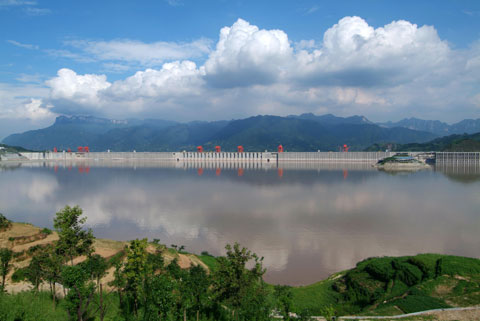
The Three Gorges Reservoir is pictured on in this July 17, 2007 file photo. [Xinhua] |
CHONGQING: At least 4 million people from the Three Gorges Reservoir area are to be relocated to cities in the next 10 to 15 years, Chongqing Municipality Vice-Mayor Yu Yuanmu said.
Chongqing's 2007-20 rural and urban development plan, which was approved by the State Council on September 20, describes the resettlements as necessary to protect the ecology of the reservoir area, said Yu.
The country's most populous municipality is set for vigorous urban expansion.
More than 4 million people currently living in northeast and southwest Chongqing, where the Three Gorges Reservoir extends for 600 km, will be encouraged to resettle in the urban outskirts, about an hour's bus ride from downtown Chongqing, according to a report on sina.com.
No details about the massive relocation are available, but Yu said the ecological safety of the Three Gorges Reservoir area is threatened by the growing population.
"On one hand, the reservoir area has a vulnerable environment, and the natural conditions make large scale urbanization or serious overpopulation impossible here," said the official.
On the other hand, Yu said, the area is already suffering from overpopulation and poor conditions for industrial development.
In March 1997, the city, which sits on the upper reaches of the Yangtze River, received approval to become a centrally administered municipality, the fourth after Beijing, Shanghai and Tianjin. It was expected to spearhead economic development in the central and western regions.
Covering 82,000 sq km, the municipality has a population of more than 27.98 million, 55 percent of whom live in rural areas.
The city's gross domestic product reached 348.6 billion yuan ($45.8 billion) last year. However, its growth has been seriously unbalanced. The per capita GDP of Wuxi county was 3,593 yuan last year, only a tenth of that in the developed Yuzhong District.
On June 7, Chongqing and Chengdu, capital of neighboring Sichuan Province, were selected by the National Development and Reform Commission, the country's top economic planner, as pilot cities to work towards coordinated and balanced development between urban and rural areas.
Planners estimate that Chongqing will have a population of 30 million, 16.15 million of them in urban areas, representing an urbanization rate of 53.8 percent by 2010. The urban population will be 21.6 million of the city's total population of 31 million by 2020, representing an urbanization rate of 70 percent.
Last month, officials and experts admitted the Three Gorges Dam project had caused an array of ecological problems, including more frequent landslides and pollution, and if preventive measures are not taken, it could lead to an environmental "catastrophe".
Tan Qiwei, vice-mayor of Chongqing, told a forum in Wuhan that the shore of the reservoir had collapsed in 91 places and a total of 36 km had caved in.
Frequent geological disasters have threatened the lives of residents around the reservoir area, said Huang Xuebin, head of the headquarters for prevention and control of geological disasters in the Three Gorges Reservoir.
Construction of the project has already necessitated the resettlement of at least 1.2 million people.
The dam, the world's largest water-control facility, was launched in 1993, with a budget of 180 billion yuan.
Located on the middle reaches of the Yangtze River, the project comprises a 185-m-high dam, completed early last year, a five-tier ship lock and the reservoir.
